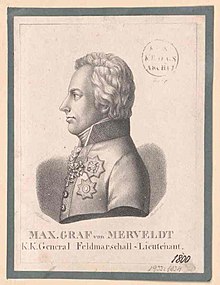Maximilian, Count von Merveldt | |
|---|---|
 | |
| Born | 29 June 1764 Münster, Westphalia |
| Died | 5 July 1815 (aged 51) London, United Kingdom |
| Allegiance | Habsburg monarchy |
| Service | Cavalry |
| Years of service | 1782–1814 |
| Rank | General of Cavalry |
| Battles / wars | Austro-Turkish War (1787–1791) French Revolutionary Wars Napoleonic Wars |
| Awards | Knight's Cross, Military Order of Maria Theresa Order of Leopold |
| Other work | Novice, Teutonic Order, 1790–1808. Ambassador, Second Congress of Rastatt Ambassador, St. Petersburg Envoy Extraordinaire, Court of St. James's |
Maximilian, Count von Merveldt (29 June 1764 – 5 July 1815), among the most famous of an illustrious old Westphalian family, entered Habsburg military service, rose to the rank of General of Cavalry, served as Francis II, Holy Roman Emperor's ambassador to Russia, and became special envoy extraordinaire to the Court of St. James's (Great Britain). He fought with distinction in the wars between the Habsburg and the Ottoman empires, the French Revolutionary Wars, and the Napoleonic Wars.
Maximilian entered the military as a young man, and acquired his first combat experiences the Habsburg wars with the Ottoman Empire. Following his experience in the Balkans, he retreated to the cloister at Bonn, where he spent a year as a novice in the Teutonic Order. At the outbreak of war between the Habsburg monarchy and France in 1792, he returned to military service, and proved an intrepid and enterprising cavalry field officer. His role in the Habsburg victory at Neerwinden in 1793 earned him the honor of conveying the news to the Emperor in Vienna.
In the War of the Second Coalition, Maximilian served in Swabia and northern Italy and Switzerland. In subsequent wars between France and the Habsburg Monarchy, his role on the battlefield often meant the difference between defeat and victory. He was wounded and captured at the Battle of Leipzig and, as a condition of release, he agreed not to bear arms against France again. He was subsequently appointed as an envoy to Britain, where he died in 1815.